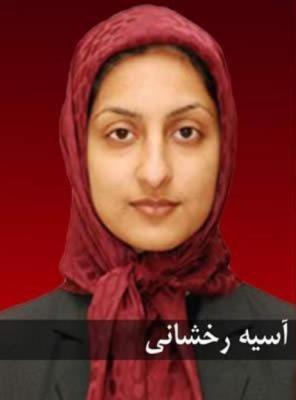San Jose Mercury News

Iranian journalist Asieh Rakhshani, who lived in Richmond and Albany for most of her childhood, was killed April 8 in a raid in Camp Ashraf in Iraq during a clash with Iraqi forces. ((Courtesy of Hamid Yazdanpanah))
For years, a Bay Area couple had been trying to publicize the danger that dissidents from their native Iran faced at a camp across the border in Iraq. Then, in April, Parviz and Ensieh Yazdanpanah’s greatest fear came true in a very personal way: Their adopted daughter was one of three dozen unarmed people killed at Camp Ashraf by Iraqi troops.
A family photo album that includes childhood pictures of birthday parties ends with the images of 30-year-old Asieh Rakhshani bleeding to death in an Ashraf hospital.
“She died hoping for peace and freedom in the region,” her mother said, breaking into tears.
On Monday, the couple and hundreds of others from the Bay Area’s Iranian-American community again raised their voices in protest in front of the White House, where President Barack Obama welcomed Iraqi Prime Minister Nouri al-Maliki, the man whom the Yazdanpanahs accuse of ordering the attack on the camp that killed their daughter.
Rakhshani, who was training to be a journalist, had returned to Iraq to volunteer at the camp. When Iraqi troops attacked April 8, firing into crowds, she captured it on video.
In the video, “you can hear her voice shouting, ‘Allahu akbar,’ ” or “God is great,” her mother said. Then Rakhshani witnessed the shooting of a friend nearby. “Her friend next to her fell, and she’s screaming, ‘They shot her! They shot her!’ … While she was shouting, they shot her, and the camera rolled off her hand.”
Facing a bloodbath
Camp Ashraf is home to a now-disarmed Iranian militia that once waged war on Iran with the support of Saddam Hussein. With the rise of an Iraqi government with close ties to Tehran, the people in the camp are in an increasingly precarious position. Complicating their fate, the organization that controls the camp is listed by the U.S. as a terrorist organization and described by many as a cult.
But the Yazdanpanah family says the 3,400 people at Camp Ashraf are facing a bloodbath if the Iraqi government follows through on plans to forcibly close it by the end of the year.
“Their goal is to take them one by one, put them in a bigger jail inside Iraq, and from there deport them to Iran,” said Ensieh Yazdanpanah, 50, of El Sobrante. “And if that happens, we know they’re going to be killed. They’re going to be tortured, and they’re going to be killed.”
She said a few thousand Iranian-Americans, including about 500 from the Bay Area, showed up at Monday’s protest, at which former FBI Director Louis Freeh and former Homeland Security Secretary Tom Ridge spoke in support of extending the Dec. 31 deadline for the camp to close.
The residents of Ashraf are members of the People’s Mujahedeen of Iran (PMOI, also known as MEK for its Farsi initials), a group that arose in 1965 in opposition to Shah Reza Pahlavi and later fought the clerics who overthrew him in 1979. The group has often been described as having a Marxist/Islamic ideology, but members say it favors democracy, freedom and religious tolerance in an Iran free of nuclear weapons.
Detractors say the group engages in cultlike practices under its leaders, husband-and-wife team Massoud and Maryam Rajavi, which include forced divorces and tape-recorded sessions of self-criticism designed to ensure loyalty. Older members were reportedly forced to divorce in the late 1980s, and younger members are said to have been pressured into vows of celibacy.
The PMOI moved its headquarters to Iraq in 1986, during the Iran-Iraq War, and Saddam allowed the group to build Camp Ashraf, 65 miles north of Baghdad, and helped to finance and arm its attacks on Iran. The militia is widely believed to have aided Saddam in the brutal suppression of uprisings by Kurds in northern Iraq and Shiites in southern Iraq in 1991, a charge it denies.
Charges of cultism
Half of the group’s fighters and most of its commanders were women, according to a New York Times Magazine writer, Elizabeth Rubin, who visited Ashraf in 2003. She described them as an “army of Stepford wives,” robotic and adoring of their leaders, and portrayed the movement as “bizarre” and cultish, with children nurtured from birth to be fanatically loyal.
The U.S. State Department designated the PMOI a foreign terrorist organization in 1997, primarily citing its attacks against Iran. The European Union removed the group from its terror list in 2009, and its U.S. status has been under legal challenge for years.
Supporters say the group has long renounced militant activity. It gave up its weapons in 2003 in exchange for U.S. protection.
But the U.S. had transferred control of the camp to Iraq by April, when the attack came that killed Rakhshani.
The Yazdanpanah family adopted the girl as a young child when her real parents, who were living at Ashraf, asked them to take her in for her safety. She grew up in the Bay Area and graduated from Albany High School but returned to Ashraf in 1999.
“My sister made a choice to return to her parents, when she had every opportunity to live a free and easy life in the United States,” said her adoptive brother, Hamid Yazdanpanah, a 25-year-old attorney in San Francisco. “Instead, she chose a path of hardship and resistance. … My sister died working as an amateur journalist trying to document the oppression and massacre of innocent people.”
